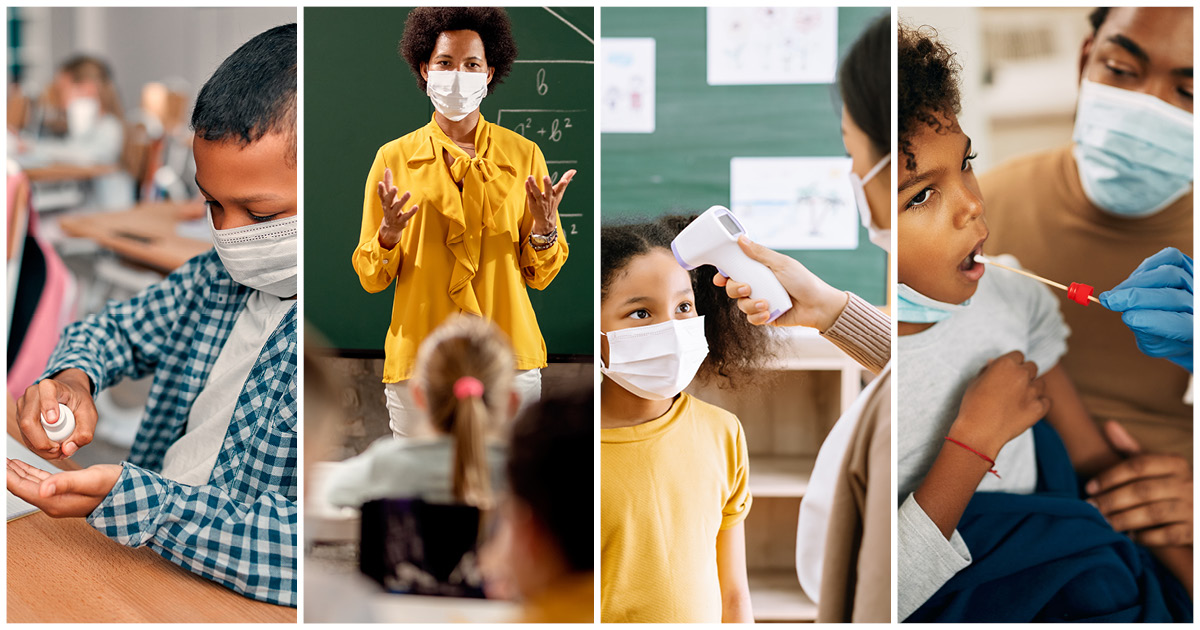New evidence from Mathematica and RAND Corporation supported by the Rockefeller Foundation, finds that regular COVID-19 testing in primary and secondary education is critical to getting students back to in-person learning. The reports include early results from the foundation’s six K–12 testing pilots, facilitated by a memorandum of understanding (MOU) with the U.S. Department of Health and Human Services (HHS) and an independent assessment of school testing programs across the country. The reports found that weekly testing of all students, teachers, and staff can reduce in-school infections by an estimated 50 percent and would give teachers the peace of mind to return to the classroom. But managing the complex logistics of an effective testing program requires significant resources.
“We want schools to be the safest place in a community next to the home, and widespread in-school COVID-19 testing helps make that possible,” said Dr. Rajiv J. Shah, president of the Rockefeller Foundation. “The classroom is so important for a children’s development, not only for educational reasons, but to restore free school meals, to give children a social outlet, and to provide myriad school-based services that are vital, especially for low-income children.”
Last week, the Centers for Disease Control and Prevention called for schools to reopen as soon as possible with precautions such as masking, social distancing, and testing in place. In addition, the Biden administration has made it a goal to open schools in its first 100 days. The new foundation-supported reports review testing programs across the country that took a variety of additional COVID-19 precautions.
“As the pandemic continues to evolve, and new variants and additional challenges emerge, combining proactive prevention measures like masking and distancing with science-based testing protocols can both protect students, teachers, and staff from COVID-19 and detect new cases before they spread,” said Andrew Sweet, managing director of COVID-19 Response and Recovery at the Rockefeller Foundation. “When evidence-based measures are implemented at schools, families, teachers, and staff should feel safe coming back to in-person learning.”
Building the evidence for reopening schools
As a result of the MOU between the Rockefeller Foundation and HHS signed in October 2020, the government agency supplied 140,000 Abbott BinaxNOW COVID-19 antigen tests to support six pilot projects in Louisville, Kentucky; Los Angeles, California; New Orleans, Louisiana; and Tulsa, Oklahoma; Washington, DC; and Rhode Island. The Mathematica report studied the efforts of these pilots to implement testing protocols developed by the Duke-Margolis Center for Health Policy and the Johns Hopkins Center for Health Security with support from the Rockefeller Foundation. The pilots looked at early findings from schools that have used or plan to use the antigen tests, and results from statistical models designed to estimate value of regular testing. They identified the following key considerations about the acceptability and feasibility of designing and setting up school-based testing programs, and the potential effectiveness of these programs:
- Weekly screening testing of all students, teachers, and staff can reduce in-school infections by an estimated 50 percent.
- Screening only teachers and staff is less effective, with estimated reductions in in-school infections ranging from 5 percent for monthly testing to 20 percent for twice weekly testing.
- The logistical and regulatory requirements for conducting screening testing in schools are complex and challenging to navigate, and schools would benefit from substantial support and coordination from local, state, and national education and public health authorities.
- Community engagement in program design is essential for acceptance.
- Clear communications about the testing program, delivered by trusted messengers, is needed to help school communities understand the strengths and limitations of the program and encourage them to participate.
“Our report provides cross-cutting considerations and implications to guide other schools and districts across the country that are considering implementing antigen testing,” said Divya Vohra, researcher at Mathematica. “Our findings can help schools and public health leaders decide how to add antigen testing to their suite of strategies to mitigate the spread of COVID-19.”
Media contact
Amy Berridge
Mathematica
+1(609)945-3378
aberridge@mathematica-mpr.com


